E-E-A-T (Experience, Expertise, Authoritativeness, Trustworthiness) is one of the key frameworks Google uses to assess the quality of content on your blog. This guide explains how each factor influences search rankings and what actions can improve them. A full checklist is provided at the end.
- Experience
- Is the author clearly identified?
- Does the content include original photos, videos, screenshots, or visuals that demonstrate real experience?
- Is the main content written from firsthand experience or simply rewritten from top-ranking pages?
- Does the author have relevant firsthand experience in the subject matter?
- Expertise
- Is the author recognized as an expert?
- Is there a clickable link to a separate author profile on the page?
- Should the article page use Schema markup?
- When the content is updated, is it clear what was changed?
- Is it shown on the page or post who reviewed the content, with a link to their author profile?
- Does the page include the Schema reviewedBy property if someone reviewed the content?
- Is the main content of the article accurate and up to date?
- Does the main content include unique quotes, opinions, or insights from the author or other experts?
- Is there any information missing from the main content that an expert would be expected to include?
- Is the query for which the article should rank informational?
- Does the main content solve the user’s problem?
- Is there an «Author byline» next to the author’s name?
- Does the author have appropriate expertise or formal education in the topics they write about?
- Does the author profile page contain an up-to-date biography?
- Does the author profile page include a photo or portrait of the author?
- Does the author profile page include their job title?
- Are the topics in which the author is an expert displayed on the author’s page?
- Does the author profile page contain information about their professional qualifications, accreditations, and education?
- Does the author profile page include links to their main social media accounts?
- Do the author’s social profiles link back to the website?
- Does the author profile page include contact information?
- Has the author participated in relevant podcasts or webinars?
- Does the author have a personal knowledge panel in Google?
- Is the author profile page marked up with ProfilePage Schema?
- Authoritativeness
- What is the website’s topic?
- Is the publication and/or last update date displayed on the article page?
- Is the content up to date? Has it been reviewed or updated recently?
- Do you check the content for spelling and grammatical errors?
- Does the main content reference sources to support claims or facts?
- Did the author make a clear effort to create the content?
- Does the article contain more useful information than similar articles in the top three positions?
- Is the article free of unnecessary filler content?
- Do other relevant sources reference or mention this material?
- Does the content align with the main topic of the website?
- Is there a clickable link on the page to a separate author page?
- Does the author profile page include links to the content they have created on the site?
- Is the author cited (preferably regularly) in the media as an expert in their main topics?
- Does the author profile page include links to external sources where the author is cited as an expert?
- Has the author been publishing content on this topic for a long time, or only recently started?
- Does the author publish content on this topic regularly or rarely?
- Does the author regularly share valuable content related to their areas of expertise on social media?
- Has the author written many posts on their core topic?
- Trustworthiness
- Does the website display a cookie policy notice?
- Does the website display a clear copyright notice?
- Does the website have an editorial policy page?
- Is there a visible disclaimer about affiliate links on the page (if applicable)?
- Google E-E-A-T Factors Checklist
Experience
Experience means that the content author has direct, hands-on familiarity with the topic. It goes beyond theoretical knowledge — it reflects practical experience that can be demonstrated through the content itself.
Why does it matter? Users and search engines are more likely to trust content created by individuals with firsthand experience. This builds both credibility and site authority, positively impacting search rankings.
Is the author clearly identified?
Does the content include original photos, videos, screenshots, or visuals that demonstrate real experience?
Is the main content written from firsthand experience or simply rewritten from top-ranking pages?
Does the author have relevant firsthand experience in the subject matter?
Expertise
Expertise refers to the depth of knowledge, skills, and qualifications the author possesses in their field. This may include formal education, professional training, or extensive practical experience that allows the author to produce accurate and trustworthy content.
Why does it matter? Both users and search engines value content created by knowledgeable and competent professionals. Demonstrating expertise builds user confidence and improves visibility in search results.
Is the author recognized as an expert?
Is there a clickable link to a separate author profile on the page?
Should the article page use Schema markup?
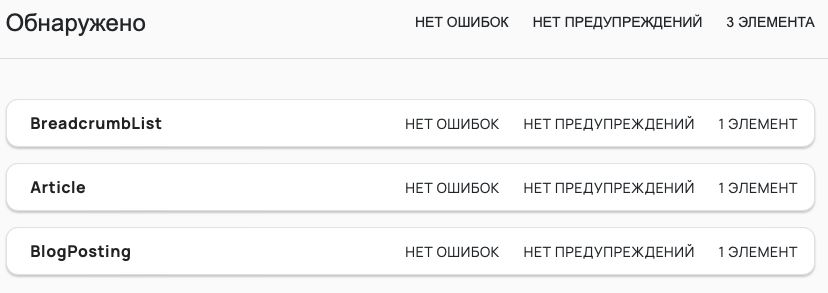
When the content is updated, is it clear what was changed?
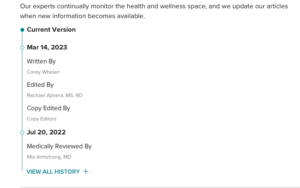
Is it shown on the page or post who reviewed the content, with a link to their author profile?

Does the page include the Schema reviewedBy property if someone reviewed the content?
Is the main content of the article accurate and up to date?
Does the main content include unique quotes, opinions, or insights from the author or other experts?
Is there any information missing from the main content that an expert would be expected to include?
Is the query for which the article should rank informational?
Does the main content solve the user’s problem?
Is there an «Author byline» next to the author’s name?
Does the author have appropriate expertise or formal education in the topics they write about?
People who create your content should have sufficient expertise, knowledge, and formal education, where applicable, in the topics they write about. Users prefer content written by those qualified to write about it.
Does the author profile page contain an up-to-date biography?
The author page is your opportunity to explain who the author is. It should include a current and detailed biography, providing insight into who they are and why they are qualified to write on the topic(s).
Does the author profile page include a photo or portrait of the author?
Users want to see the person behind the name. Make sure the author’s page includes a photo or portrait, especially since this image may appear in their personal knowledge panel.
Does the author profile page include their job title?
Displaying the author’s title on their profile page helps users trust that they are qualified (by experience and/or knowledge) to write on the topic(s). Titles often reveal a person’s background and skills.
Are the topics in which the author is an expert displayed on the author’s page?
Ensure the author page shows the areas in which the author has experience or expertise. This helps users quickly understand what subjects the author covers and is associated with on the site.
Does the author profile page contain information about their professional qualifications, accreditations, and education?

The author profile page should include information about professional qualifications, accreditations, and education.
Does the author profile page include links to their main social media accounts?

An important part of demonstrating E-E-A-T is “connecting the dots” and making it easier to verify the author’s identity. Make sure to include links to their relevant social profiles on the author page.
Do the author’s social profiles link back to the website?
Either to the homepage or the author’s page? The author’s social profiles (especially LinkedIn and their professional X profile, if available) should link back to the website, either to the author page or the homepage. If these social profiles are listed in the sameAs property in Schema markup, this helps connect them.
Does the author profile page include contact information?
Consider including direct contact details on the author page so that users can easily reach them.
Has the author participated in relevant podcasts or webinars?
Depending on the industry, participation in podcasts and webinars can help position a person as an authority in the topic.
Does the author have a personal knowledge panel in Google?

Search the author’s name in Google. Does a personal knowledge panel appear? This is a strong indicator that Google understands who the author is. Also, use the Kalicube Knowledge Graph Explorer.
Is the author profile page marked up with ProfilePage Schema?
The author profile page should be marked up using ProfilePage Schema.
Authoritativeness
Authoritativeness means that the content and its authors are recognized as authorities in their field. This is confirmed when other authoritative sources reference, cite, or acknowledge their contributions.
Why is this important? Authoritativeness is important because it signals to users and search engines that the content is trustworthy and valuable. Authoritative websites and authors have a higher chance of ranking well in search results.
What is the website’s topic?
Most websites can be easily attributed to a specific topic. Can the site’s theme be clearly identified, or is it difficult to understand its primary focus?
Is the publication and/or last update date displayed on the article page?

People trust current content more than outdated material. Make sure the publication date and/or last update date is clearly displayed on the page.
Is the content up to date? Has it been reviewed or updated recently?
Ensure that your content remains current and is reviewed regularly. Each piece should be checked at least once a year, preferably more often, especially when required in your industry.
Do you check the content for spelling and grammatical errors?
Does the main content reference sources to support claims or facts?

Make sure you cite sources when making statements or quoting someone or something. Do not believe the myth that “external links reduce your site’s authority.” You must link to the sources you mention.
Did the author make a clear effort to create the content?
Although this question may sometimes seem subjective, determining the level of effort put into content creation is often straightforward. Were any real efforts made to produce something outstanding and authoritative that the brand could be proud of?
Does the article contain more useful information than similar articles in the top three positions?
Is the article free of unnecessary filler content?
When content seems full of irrelevant details or makes it difficult to find key takeaways, it is often a sign that it was created by someone who lacks enough authority to determine what defines “excellent” content for this topic.
Do other relevant sources reference or mention this material?
Content cited as a source is a strong indicator that other websites consider it reliable and authoritative. Check backlinks to the page using Ahrefs.
Does the content align with the main topic of the website?
When a website has a clear topical focus, it becomes easier to build and demonstrate authority in that area. Make sure your content fits the site’s overall theme and is not created solely for search volume.
Is there a clickable link on the page to a separate author page?
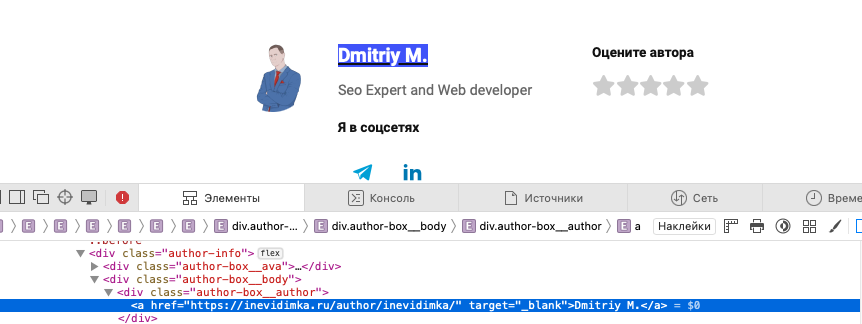
Ensure that your content includes links to individual author pages so users can easily find additional information about the person who created it.
Does the author profile page include links to the content they have created on the site?
The author’s page should display all content published by that author on the website. This is a standard feature in WordPress.
Is the author cited (preferably regularly) in the media as an expert in their main topics?
Aim for regular media coverage where the author appears as an expert, providing commentary and sharing knowledge and insights in their primary subject areas.
Does the author profile page include links to external sources where the author is cited as an expert?
If the author has been mentioned as an expert in the media or on other authoritative websites, add links to those references on their profile page.
Has the author been publishing content on this topic for a long time, or only recently started?
An author who has been publishing on their main topic for a long time is generally considered more authoritative than one who only recently began writing about it.
Does the author publish content on this topic regularly or rarely?
Does the author regularly share valuable content related to their areas of expertise on social media?
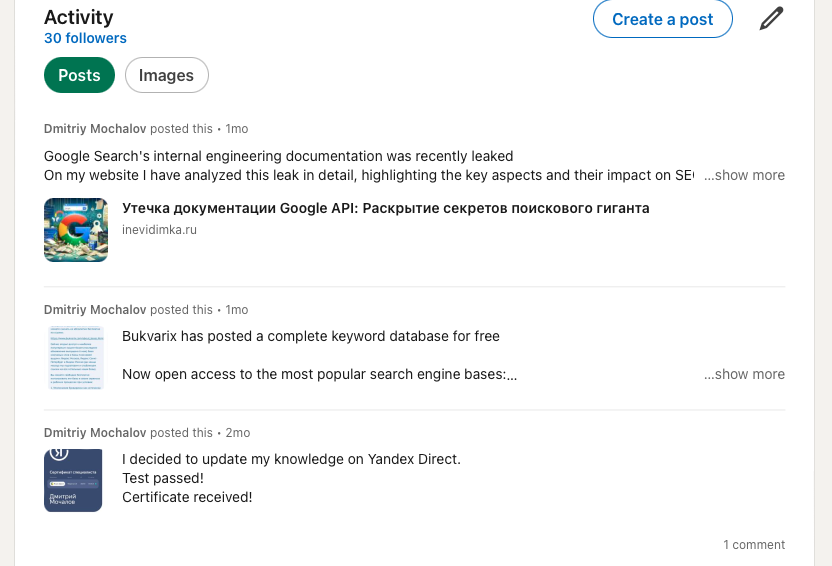
Has the author written many posts on their core topic?
Trustworthiness
Trust means that users and search engines perceive your content as reliable and truthful. This is an essential aspect that helps convince users of your content’s quality and accuracy and improves your website’s ranking in search results.
Why is this important? Trust is the foundation for attracting and retaining an audience. Users tend to return to websites they consider reliable and share their content with others. Search engines such as Google also take into account a site’s trust level when ranking it.
Does the website display a cookie policy notice?

Does the website display a clear copyright notice?

Does the website have an editorial policy page?
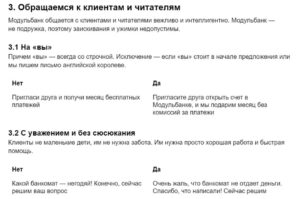
Is there a visible disclaimer about affiliate links on the page (if applicable)?
Google E-E-A-T Factors Checklist

The E-E-A-T audit checklist is divided into three sections:
- E-E-A-T signals at the brand level
- E-E-A-T signals at the content level
- E-E-A-T signals at the author level
Brand-level signals apply to the website and/or business that publishes the content. Think of them as site-wide indicators.
Content-level signals apply to a specific page, post, or piece of content on the site. Think of them as page-level indicators.
Author-level signals apply to the person responsible for creating a specific page, post, or piece of content. Think of them as signals specific to the individual author.
In each section, you will find descriptions and dropdown lists for marking findings. Conduct an audit of your website by reviewing and analyzing each signal and assigning one of the available statuses in the dropdowns.
